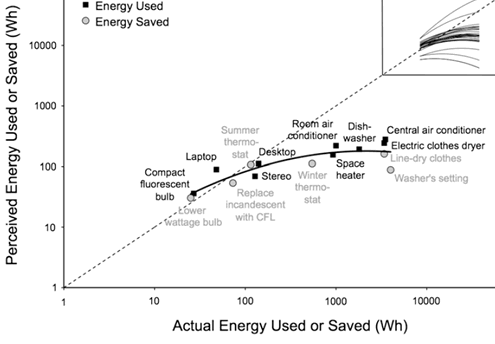Decision Science News of the week August 27, 2010
 Subscribe to Decision Science News by Email (one email per week, easy unsubscribe)
Subscribe to Decision Science News by Email (one email per week, easy unsubscribe)
DSN OF THE WEEK

In response to last week’s post, Mike DeKay sent in this paper, which PNAS is good enough to let you down load for free.
CITATION
Attari, S. Z., DeKay, M. L., Davidson, C. I., & Bruine de Bruin, W. (in press). Public perceptions of energy consumption and savings. Proceedings of the National Academy of Sciences of the United States of America.
ABSTRACT
In a national online survey, 505 participants reported their perceptions of energy consumption and savings for a variety of household, transportation, and recycling activities. When asked for the most effective strategy they could implement to conserve energy, most participants mentioned curtailment (e.g., turning off lights, driving less) rather than effciency improvements (e.g., installing more effcient light bulbs and appliances), in contrast to experts’ recommendations. For a sample of 15 activities, participants underestimated energy use and savings by a factor of 2.8 on average, with small overestimates for low-energy activities and large underestimates for high-energy activities. Additional estimation and ranking tasks also yielded relatively flat functions for perceived energy use and savings. Across several tasks, participants with higher numeracy scores and stronger proenvironmental attitudes hadmore accurate perceptions. The serious defciencies highlighted by these results suggest that well-designed efforts to improve the public’s understanding of energy use and savings could pay large dividends.
For press coverage, see The New York Times, USA Today, Newsweek, The Economist, National Geographic, and Pocket Science on YouTube, among others.
– – – – – – – – – – – – – – – – – – – – – – – – – – – – – – – –
Peter McGraw, who is a big (in the sense of “notable” and in the sense of “six foot five inches tall” ) Decision Making researcher has launched a new
There’s a nice profile of the man here: What makes us laugh? Professor Peter McGraw thinks he’s found the answer to one of humanity’s greatest questions
– – – – – – – – – – – – – – – – – – – – – – – – – – – – – – – –
Here is a cool paper documenting an amusing sort of less-is-more effect in which professionals do worse than laypeople in a crime-solving task. In addition, learning valid information decreases people’s accuracy. That said, logisitic regression beats ’em all, which doesn’t fit the less-is-more theme, but then again, logistic regression is less than human.
CITATION
Bennell, C; Bloomfield, S; Snook, B; Taylor, P; Barnes, C. (2010). Linkage analysis in cases of serial burglary: comparing the performance of university students, police professionals, and a logistic regression model. Psychology, Crime and Law 16 (6), 507-524.
ABSTRACT
University students, police professionals, and a logistic regression model were provided with information on 38 pairs of burglaries, 20% of which were committed by the same offender, in order to examine their ability to accurately identify linked serial burglaries. For each offense pair, the information included: (1) the offense locations as points on a map, (2) the distance (in km) between the two offenses, (3) entry methods, (4) target characteristics, and (5) property stolen. Half of the participants received training informing them that the likelihood of two offenses being committed by the same offender increases as the distance between the offenses decreases. Results showed that students outperformed police professionals, that training increased decision accuracy, and that the logistic regression model achieved the highest rate of success. Potential explanations for these results are presented, focusing primarily on the participants’ use of offense information, and their implications are discussed.
– – – – – – – – – – – – – – – – – – – – – – – – – – – – – – – –
Finally, Isaac Dinner and I are working on a thought piece that applies our research on defaults to the question of energy conservation. It’s called:
- Goldstein, D. G. & Dinner, I. M. A fairly mechanical method for policy innovation. Working paper.
We may add something about “reducing carbon emissions” to the title. We welcome feedback in the next week.

